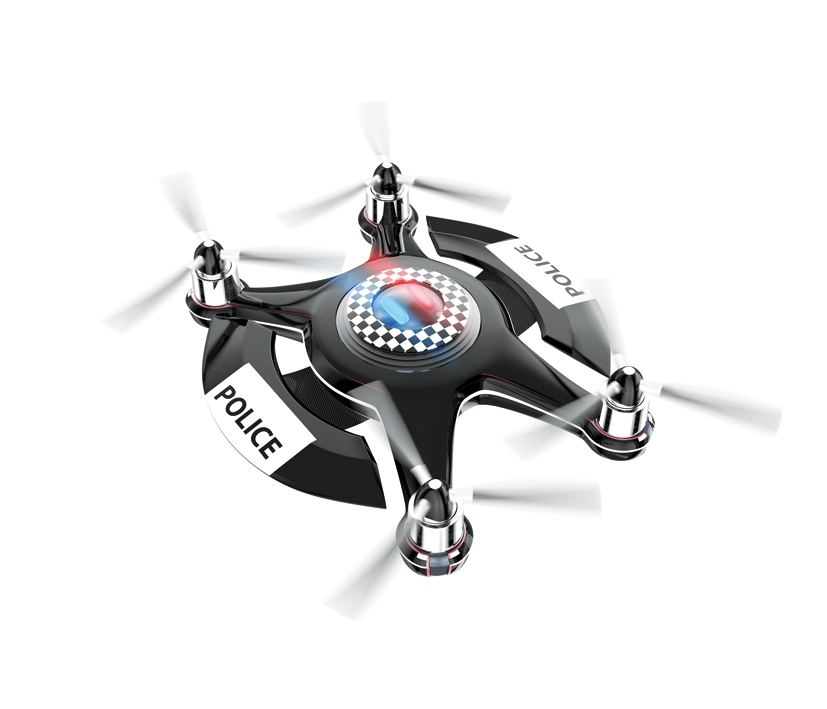Revolution in the sky for policing
Drones could revolutionise policing in the same way that the introduction of police radios did in the 1960s. Thats according to Dorsets police and crime commissioner (PCC) who believes drones unmanned aerial vehicles (UAVs) have a key role to play in the fight against crime and protecting the public.
Drones could revolutionise policing in the same way that the introduction of police radios did in the 1960s. Thats according to Dorsets police and crime commissioner (PCC) who believes drones unmanned aerial vehicles (UAVs) have a key role to play in the fight against crime and protecting the public.
Dorset Police is one the few forces across England and Wales that already uses drones, sharing four with neighbouring Devon and Cornwall Police in an arrangement that has been fully licensed by the Civil Aviation Authority (CAA).
They are used to help officers in their investigations by taking high-definition aerial photographs, recording videos and maps. The two forces have also used them to take photographs at crime scenes and road accidents, and also assist in the search for missing persons.
Dorset PCC Martyn Underhill now wants to see more used by the police.
Policing needs to be at the forefront of technology and quick to embrace innovation, he said earlier this year.
Look at how the portable two-way radios transformed policing in the 1960s I believe drones have the capability to revolutionise the way we police in this country in a similar way, while saving a substantial amount of public money.
Whether it is helping search for a missing person, recording evidence for later use in a criminal investigation or giving police officers a unique birds eye view of a particular situation, the potential UAVs have for helping forces is huge.
The Surveillance Camera Commissioner Tony Porter recently visited Dorset for a demonstration of the drones in use. The Dorset Police and Devon and Cornwall Police strategic alliance is now working with Mr Porters office to achieve third-party certification regarding their use.
This would help demonstrate that the alliance complies with the surveillance camera code of practice.
Mr Underhill believes it is this openness and transparency around UAVs that should reassure the public about their use.
He added: I know there will be some people who feel uneasy about police using this equipment, but in my view, the law-abiding public has nothing to fear. Providing strong governance is in place, there is no reason why police drones cant become as familiar a sight as patrol cars, a police helicopter or an officer on the beat.
Mr Underhill said drones were not being seen as a replacement to police helicopters, as some commentators have speculated, but rather an additional tool in the police toolbox.
Bedfordshires former PCC Olly Martins said the use of drones was the same principle as equipping officers with body-worn video and mobile IT it is about using technology to make officers more effective.
And Sussex Police Assistant Chief Constable Steve Barry, the national lead for drones, said: This is not about providing cut-price policing but about using technology to enhance the way we work.
He said the benefits of the UAV system had already been demonstrated during trials by Sussex Police and Surrey Police: They can go to places where it is unsafe for officers and can gather evidence quickly that could be vital in an investigation or that could help us deploy officers to the right places at the right time, potentially allowing us to make life-saving decisions.
There are exciting opportunities for the future use of police drones, added Mr Underhill. In Dorset we are looking at the potential to use them to 3D map serious road collisions. This could be beneficial in speeding up the safe opening of main arterial routes which often have to be closed for hours following a serious accident.
And they could also be used to fly automated set routes, for example in a crime hotspot area. In an era when police funding is so challenging, all forces need to explore the potential an asset like UAVs would give them.
I believe, once we demonstrate further the benefits of UAVs, that the public will be fully behind their use in helping keeping them safe.
Among the 1,702 Civil Aviation Authority-approved commercial operators of small



